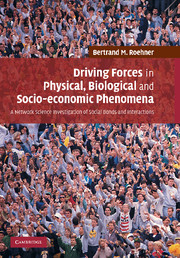 Driving Forces in Physical, Biological and Socio-economic Phenomena
Driving Forces in Physical, Biological and Socio-economic Phenomena Book contents
- Frontmatter
- Contents
- Preface
- Part I Bridging the gap between physics and the social sciences
- 1 Probing bonds
- 2 The battle against noise in physics
- 3 The battle against noise in the social sciences
- 4 Equilibrium and metastable states
- 5 Are the data reliable?
- Part II Macro-interactions
- Part III Micro-interactions: a network explanation of suicide
- References
- Index
5 - Are the data reliable?
Published online by Cambridge University Press: 02 December 2009
- Frontmatter
- Contents
- Preface
- Part I Bridging the gap between physics and the social sciences
- 1 Probing bonds
- 2 The battle against noise in physics
- 3 The battle against noise in the social sciences
- 4 Equilibrium and metastable states
- 5 Are the data reliable?
- Part II Macro-interactions
- Part III Micro-interactions: a network explanation of suicide
- References
- Index
Summary
It would be a waste of time and energy to analyze and try to make sense of flawed or unreliable data. Ensuring the reliability of experimental data is a cornerstone of the natural sciences. In physics there is a proven procedure through which the validity of experimental results is established. Every time researchers claim to have observed a new physical phenomenon other teams around the world try to replicate the results. If their observations are consistent with those obtained by the first team, the phenomenon will be given the status of a new physical effect, often named after its discoverers. The Foucault pendulum (1851), the Zeeman effect (1902), and the Aharonov–Bohm effect (1959) are a few examples among many. On the contrary, if the claimed result cannot be replicated, the physics community comes to the conclusion that the first observation was spurious. A case in point was the flawed discovery of cold fusion in 1989, which will be described in some detail below. In what follows, this phase of verification will be referred to as the replication procedure. It provides an efficient way through which flawed observations can be eliminated. Unfortunately, there is no similar procedure in the social sciences even in cases where replication would be possible. In a previous chapter we mentioned the fact that thirty years after its discovery the reality of the Werther effect is still not clearly established.
- Type
- Chapter
- Information
- Driving Forces in Physical, Biological and Socio-economic PhenomenaA Network Science Investigation of Social Bonds and Interactions, pp. 80 - 100Publisher: Cambridge University PressPrint publication year: 2007


